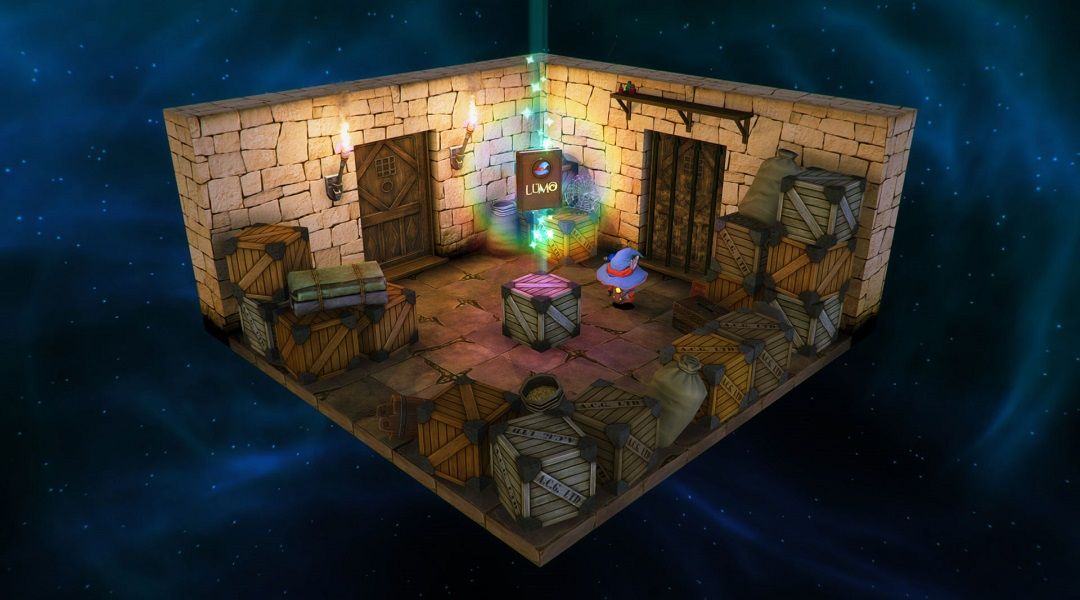Lumo is a charming throwback to the isometric arcade adventure games of the 1980s, but is held back by its short length and some frustrating platforming sections.
Lumo begins with players in control of a poorly animated male or female adolescent, who is then seemingly sucked into a magical video game. This odd and out of place opening sequence doesn't leave one with a positive first impression of Lumo, but Crackdown 2 developer Gareth Noyce mostly makes up for it when players get to the actual game, which is an isometric arcade adventure throwback in the style of Knight Lore and Head Over Heels.
This isometric style is virtually unheard of in gaming in this day and age, and that is part of the reason why Noyce, formerly of Ruffian Games, decided to create Lumo in the first place. To his credit, it does seem as though Noyce has nailed a modern take on the genre, but having its roots in decades-old game design serves as both Lumo's primary defining feature as well as a source of some of its more frustrating moments.
It seems likely that gamers used to modern conveniences will find Lumo especially frustrating, starting with its control scheme. Lumo controls exactly like the isometric titles of the past, which can make some of the trickier platforming sections a nightmare. For those unaware, the isometric layout means that movement is relative to the angle of the room, and where the player character is in that room. For example, pressing "up" may make the player character go to the "left" instead of forward like it would in most other games.
This control issue is mitigated a bit by Lumo offering multiple control schemes. Lumo is able to avoid other frustrations from the genre with additional conveniences, such as gifting players with infinite lives. Those looking for a more traditional, old-school challenge have the option of forgoing these benefits, however.
Infinite lives or no, Lumo's platforming sections can still be annoying, especially the longer ones that have no checkpoints. Even so, most of the platforming in Lumo is actually quite fun and exhilarating, with mechanics reminiscent not only of classic isometric adventure games, but also older 3D platformers, with some sections that wouldn't feel out of place in the original Crash Bandicoot on PS1.
Besides platforming, Lumo also has a strong puzzle-solving element. The puzzles in the game are generally clever, and include interesting twists on video game puzzle cliches. Take the tried-and-true "crate puzzle," for instance. Instead of just having players push crates around like in most other games, many of the crates in Lumo actually come to life, become infatuated with the player character, and chase them around the room in an attempt to show their love.
The puzzle-solving and platforming make up the majority of one's time with Lumo. There's not really any combat to speak of, with the exception of a staff that can be illuminated to scare away spiders. Having said that, Lumo does have a third key element to its gameplay, and that is exploration.
Players that are especially thorough when exploring Lumo's many rooms will be treated to various collectibles (like rubber duckies) and hidden mini-games. These mini-games are enjoyable, and offer players more fast-paced action than the rest of Lumo. Making them more easily accessible would have been nice, though, as they are fairly hard to beat, and players are only given a handful of opportunities to play them throughout the game.
Another issue with Lumo is its short length. While earning all of its trophies would take pure mastery of the game, most players will likely have their fill after beating it once, and a single playthrough of Lumo will only take a few hours time, at maximum. Considering its short length, it's somewhat difficult to recommend Lumo to people that aren't genre enthusiasts.
Regardless, publisher Rising Star Games clearly saw something special with Lumo, and while it has its flaws, it's probably as good as an isometric throwback can be. Gamers that grew up with the genre will enjoy Lumo for its nostalgic kick, but those that have never played an isometric adventure title like this may not be able to derive as much enjoyment from the game.
Trailer
[HTML1]
Lumo is available now for PC, PlayStation 4, PlayStation Vita, and Xbox one. Game Rant was provided a PS4 code for this review.

